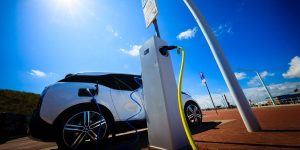Wary of being left behind in the race for renewable and electric vehicles, oil marketing companies are quietly drawing up plans to expand their modest presence in renewable energy space.

Indian Oil Corp. Ltd, the largest of the three big oil marketers, is exploring opportunities for setting up battery charging stations and battery replacement facilities for electric vehicles in its petrol pumps. According to company’s annual report they are also looking at opportunities for manufacturing and retailing lithium-ion batteries.
The centre is pushing solar and wind energy as well as electric vehicles, to curb oil imports and pollution, and meet its commitments under the Paris accord on climate change. India pledged to reduce carbon emissions relative to its gross domestic product by 33-35% from 2005 levels by 2030, under the accord.
India also pledged that by 2030, 40 percent of the country’s electricity would come from non-fossil fuel-based sources such as wind and solar power.
By 2021-22, Bharat Petroleum Corp. Ltd (BPCL) sees 5 percent of its revenue coming from non-fossil fuel sources.
BPCL has shortlisted 10 oil depots and liquified petroleum gas bottling plants for installation of rooftop solar plants. By March 2017, rooftop solar units had been installed in 1,001 of its retail outlets. BPCL is carrying out a detailed feasibility and system design study at 19 company-owned and company-operated retail outlets in a pilot for solarizing (putting solar panels) large-format retail outlets, the firm said in its annual report for 2016-17.
Hindustan Petroleum Corp. Ltd (HPCL) is strengthening its presence in natural gas and renewables to align its business to the changing patterns of demand and seeking to tap potential opportunities.
HPCL operates wind farms of 100.9MW capacity installed in Rajasthan and Maharashtra.



























